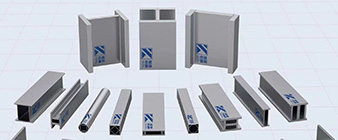316 stainless steel (AISI 316) and EN 1.4401 (AISI 316) stainless steel have a variety of typical applications, and their differences are based on their slight variations:
Chemical and Petrochemical Industry:
Tanks, vessels, piping and equipment for handling corrosive chemicals and acids
Offshore oil and gas platform
Pulp and paper processing equipment
Food and Beverage Industry:
Food processing equipment such as water tanks, mixers and conveyor systems
Brewing and Brewing Equipment
Dairy processing equipment
Marine and Coastal Applications:
Boat Accessories, Hardware and Fasteners
Coastal infrastructure such as marinas, docks and seawater intake systems
Architectural and Decorative Applications:
Facades, roofs and facades
Interior design elements such as railings, trim and ornaments
Medical and Pharmaceutical Industries:
Surgical instruments, implants and laboratory equipment
Pharmaceutical handling equipment
Chemical and Petrochemical Industry:
Similar to 316 stainless steel, but focused on more corrosive environments
Tanks, vessels, piping and equipment for handling highly corrosive chemicals and acids
Food and Beverage Industry: Similar to 316 stainless steel, with emphasis on applications requiring enhanced corrosion resistance
Marine and Coastal Applications: Offshore platforms, vessels and other marine structures exposed to seawater and saltwater environments
Architectural and Decorative Applications: Similar to 316 stainless steel, but focused on coastal and marine environments
Medical and Pharmaceutical Industries:
Similar to 316 stainless steel, with emphasis on applications requiring enhanced corrosion resistance
The key difference is that EN1.4401 (AISI316) stainless steel is often preferred in applications where higher corrosion resistance is required, especially in chloride-containing environments or more severe chemical processing conditions. This makes it a better choice for certain industrial, marine and medical applications compared to the standard 316 grade.
-
 2024-9-29 Alloy 617 (N06617 / 2.4663) Structural Profiles
2024-9-29 Alloy 617 (N06617 / 2.4663) Structural Profiles -
 2024-9-27 318LN Stainless Steel Structural Beams and Columns
2024-9-27 318LN Stainless Steel Structural Beams and Columns -
 2024-9-15 Introduction to the performance of 1.4301/1.4307 stainless steel
2024-9-15 Introduction to the performance of 1.4301/1.4307 stainless steel -
 2024-9-21 S960QH/S960QLH Hollow structural Stations in Hong Kong
2024-9-21 S960QH/S960QLH Hollow structural Stations in Hong Kong -
 2024-2-20 310 (1.4845) stainless steel plate
2024-2-20 310 (1.4845) stainless steel plate -
 2024-9-19 Alloy 718/2.4668/UNS N07718 in offshore energy applications
2024-9-19 Alloy 718/2.4668/UNS N07718 in offshore energy applications -
 2024-9-24 What are the typical applications of 1.4401 stainless steel structural hollow sections?
2024-9-24 What are the typical applications of 1.4401 stainless steel structural hollow sections?



